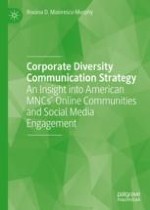2020 | OriginalPaper | Buchkapitel
12. Conclusions from the Consumer Goods Industry
verfasst von : Roxana D. Maiorescu-Murphy
Erschienen in: Corporate Diversity Communication Strategy
Aktivieren Sie unsere intelligente Suche, um passende Fachinhalte oder Patente zu finden.
Wählen Sie Textabschnitte aus um mit Künstlicher Intelligenz passenden Patente zu finden. powered by
Markieren Sie Textabschnitte, um KI-gestützt weitere passende Inhalte zu finden. powered by
